The 7 Best Stud Finders of 2023, Tested and Reviewed
Dotdash Meredith and Yahoo Inc. may earn commission or revenue on some items through the links below.
Tackle home projects like a professional.
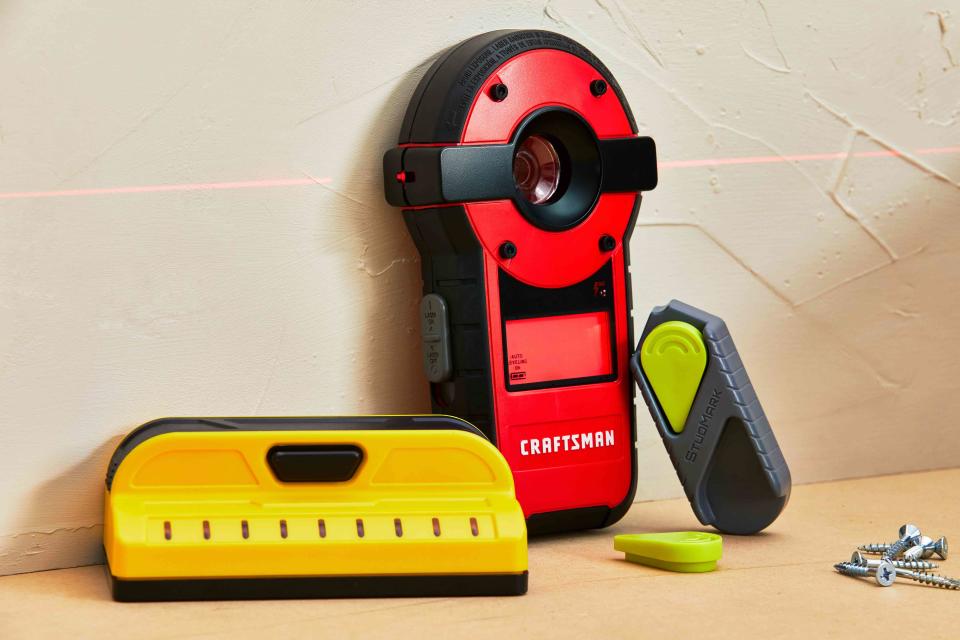
Real Simple / Henry Wortock
When working on any home improvement project, whether hanging up a mirror or securing shelves to the wall, you need the proper tools at your disposal. A stud finder is essential to determine what you’re drilling and ensure support for a lasting hold.
“The most common use for a stud finder is locating wall studs, which are boards that function as framing elements in your home, supporting the walls,” says Brian Shaunfield, store manager at a Charlotte-area Lowe’s. “Homeowners most often encounter the need to locate these framing boards when hanging an object—mirror, art, decor or otherwise—using the stud as a stable and safe anchor.”
To find the best stud finders on the market, we tested 30 models in our Lab, evaluating them on performance, design, ease of use, and value. We also spoke with experts to get their insight on perfecting your next DIY.
Franklin Sensors ProSensor M90 Professional Stud Finder
Best Overall Stud Finder
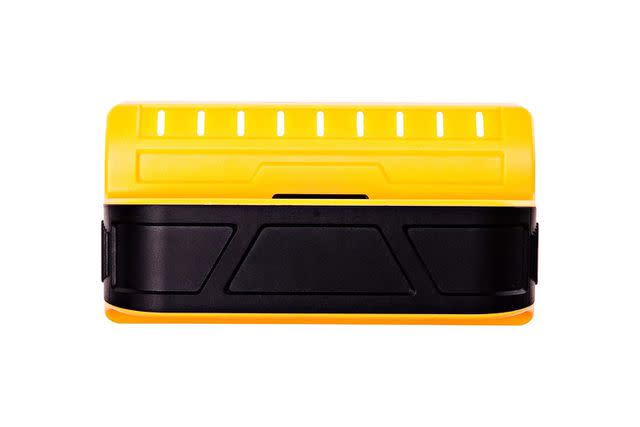
Who it’s for: People who want an accurate stud finder with extra-helpful LED lights.
Who it isn’t for: People looking for a stud finder with a display.
For a stud finder that can help with any home project, we recommend the Franklin Sensors ProSensor M90. This battery-powered electronic stud finder features nine ultra-precise sensors, along with nine precision LEDs that illuminate the length and width of the stud to provide even better precision.
During our testing, the LED lights made it easy to identify the entire stud, from the center to the edge points, for a comprehensive and complete reading. It also worked well on various surface types, though we noticed that it detected metal more quickly than wood, electrical, PVC pipe, and copper.
This stud finder only comes with one mode, so you don’t have to toggle between several options, and doesn't require calibration either—all you have to do is press the button to begin scanning. The streamlined design of this stud finder made it simple to use and read, and it only took one try to accurately detect the stud. While undoubtedly a quality option, this stud finder may be too large for people with small hands. Still, there is a lot to love about this durable, effective, and time-saving device.
Price at time of publish: $40
Product Details:
Sensor Type: Electronic
Max Detection Depth: 1.5 inches
Weight: 7 ounces
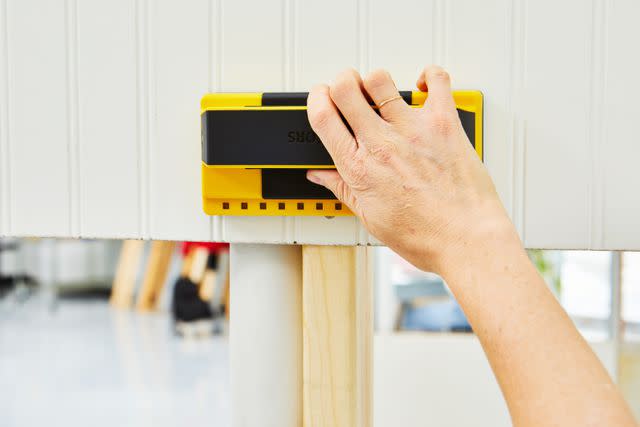
Real Simple / Henry Wortock
Craftsman CMHT77633 Stud Sensor
Best Budget Stud Finder
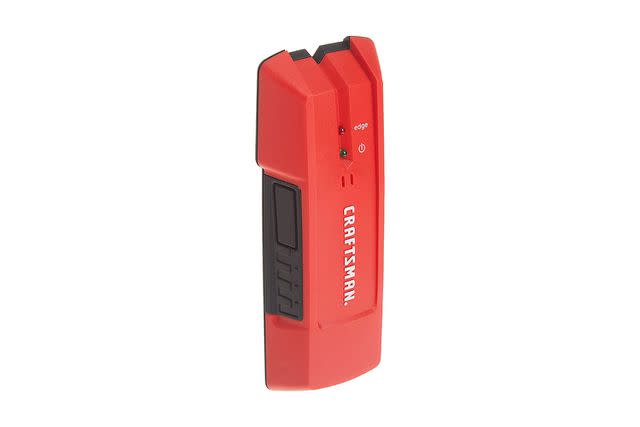
Who it’s for: People who want an affordable, compact stud finder.
Who it isn’t for: People who want a sizable stud finder with extra features.
There's no need to empty your wallet when buying quality home tools—this affordable Craftsman electronic stud finder has all the features you need for streamlined home projects. In our tests, we found this device to be accurate, lightweight, and easy to use, making it a must-buy for those looking to keep costs low while tackling home projects.
This stud finder detected studs with spot-on precision and speed and only needed a short amount of time for calibration. Because it only detects studs’ edges, you have to determine the center from the edge markings. And although the device features helpful LED lights, it doesn’t boast any other additional features. While some people may want more features, the simple design makes this pick easy to operate and equally functional. The tool is also compact and lightweight, so you can tuck it into your pocket as you move around the house.
Price at time of publish: $13
Product Details:
Sensor Type: Electronic
Max Detection Depth: 0.75 inches
Weight: 3.2 ounces
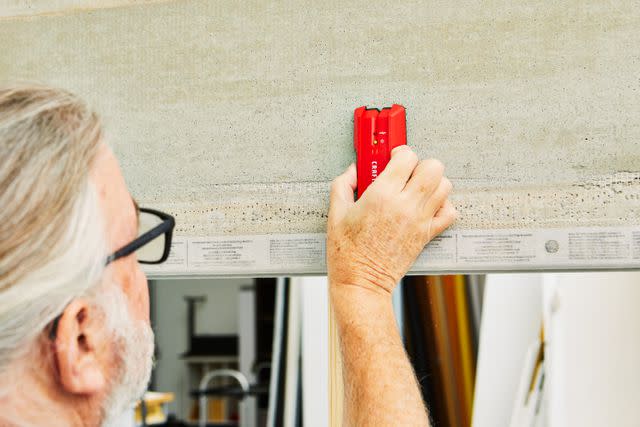
Real Simple / Henry Wortock
Calculated Industries 7310 StudMark Magnetic Stud Finder
Best Magnetic Stud Finder
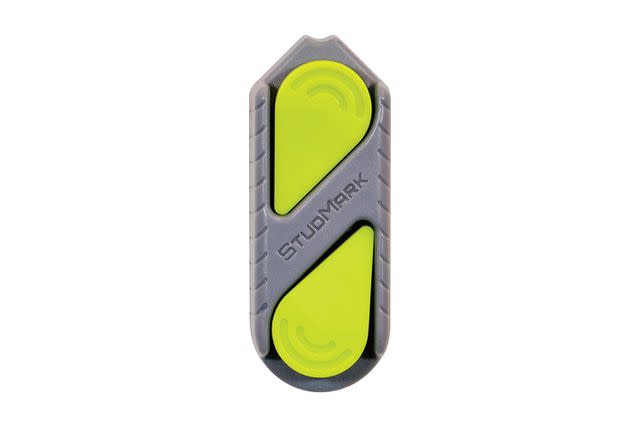
Who it’s for: People who want a fast-acting, easy-to-use, and lightweight stud finder.
Who it isn’t for: People who want a stud finder that can locate small nails or screws.
Magnetic stud finders look for nails rather than studs, and this one from Calculated Industries proved to be a particularly great pick for honing in on hidden nails in our evaluations. The compact, fast-acting device comes with two removable teardrop-shaped magnetic stud markers, which you can use to mark several stud locations—no pencil marks needed.
To use this stud finder, swipe the magnet in a Z or S movement to find the first nail or screw. Then, pull off one of the magnets and place it on the wall before scanning vertically to find the second nail or screw. Our tests found the detachable teardrop magnets convenient for creating a vertical line to determine the center of the stud.
This device is affordable and small enough to fit into the palm of your hand, making it easy to hold and move across your wall. The main downside to this pick is that it didn't always accurately detect super-tiny nails or screws. Still, this stud finder is easy to use, compact, and convenient.
Price at time of publish: $15
Product Details:
Sensor Type: Magnetic
Max Detection Depth: Not listed
Weight: 2.9 ounces
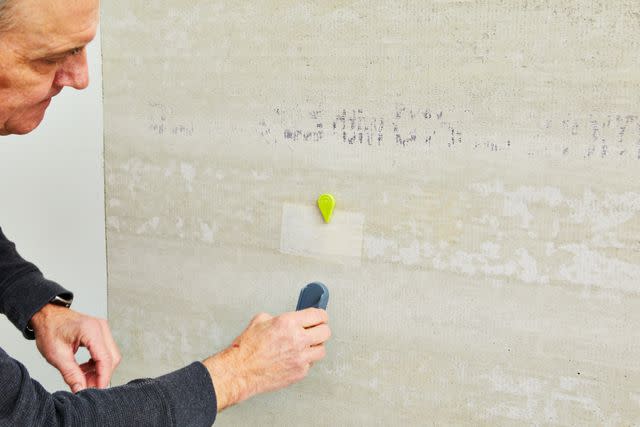
Real Simple / Henry Wortock
Franklin Sensors ProSensor 710 Professional Stud Finder
Best Stud Finder for Beginners
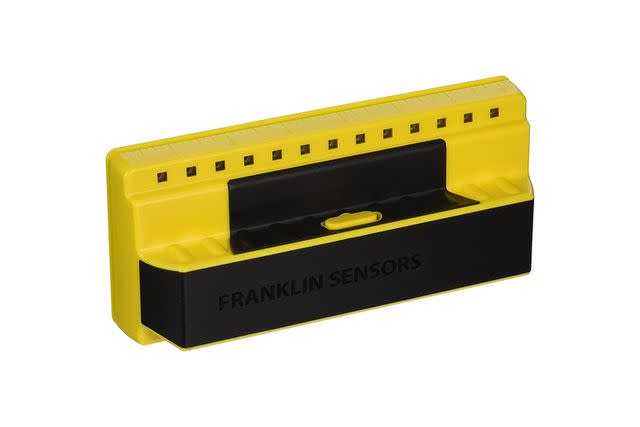
Who it’s for: People who want a precise stud finder that’s easy to use and comfortable to hold.
Who it isn’t for: People who want a lower-priced stud finder that shows the material detected.
If you are new to home projects, opt for the beginner-friendly Franklin Sensors ProSensor 710. It doesn’t require calibration or tuning, and its bright LED lights make it easy to see and identify the widths of several studs at once.
During our testing, it detected every stud type (metal and wood) over drywall, paneling, and plaster with impressive speed and precision, though it was unable to detect electric cords. It was also exceedingly easy to use—just press the button and drag the stud finder across the surface to immediately locate the studs. We also found it to be comfortable to hold regardless of hand size.
This stud finder uses illuminated dots to indicate the outside and middle of each stud, so you can get a full view before drilling or hammering. Unfortunately, it doesn’t tell you the type of material detected, making it hard to differentiate between piping and studs. During our testing, we found that studs usually illuminated three dots while piping illuminated two, which can give you a clue about what material is beneath your wall. The price is high compared to most other options on our list, but considering how simple it is to use and how accurate the results are, we think it's worth the investment.
Price at time of publish: $75
Product Details:
Sensor Type: Electronic
Max Detection Depth: 1.1 inches
Weight: 9 ounces
Mecurate Stud Finder Wall Scanner
Best Stud Finder With Display
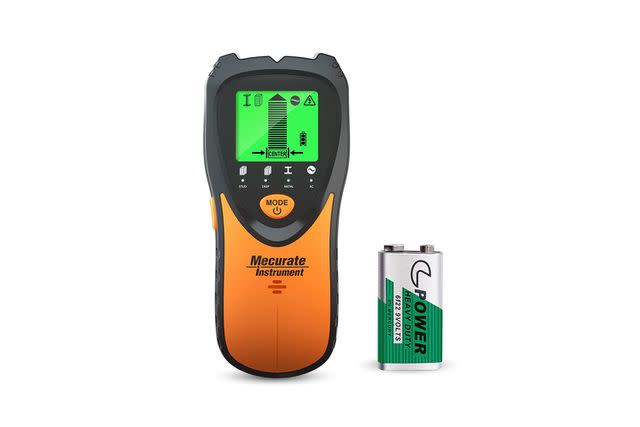
Who it’s for: People who want to track their stud-finding progress with a helpful LED display.
Who it isn’t for: People who want a simple stud finder with minimal bells and whistles.
The Mecurate Stud Finder has a large, backlit LED screen that displays real-time alerts and directional arrows to help you find studs faster. During our testing, this stud finder produced the most consistent results with a few slow passes over the wall rather than quick passes. It also features five scanning modes, which you can use to detect different materials, and a buzzer that alerts you when a stud is detected.
This stud finder requires you to calibrate it for a few seconds before each use and that you use the correct mode for the task at hand. But once you get going, the display is quite helpful at detecting wiring, studs, and other materials. The audio and visual indicators made it easy to use, and the center has a cut-out area for convenient pencil markings.
Price at time of publish: $26
Product Details:
Sensor Type: Electronic
Max Detection Depth: 1.5 inches
Weight: 9.2 ounces
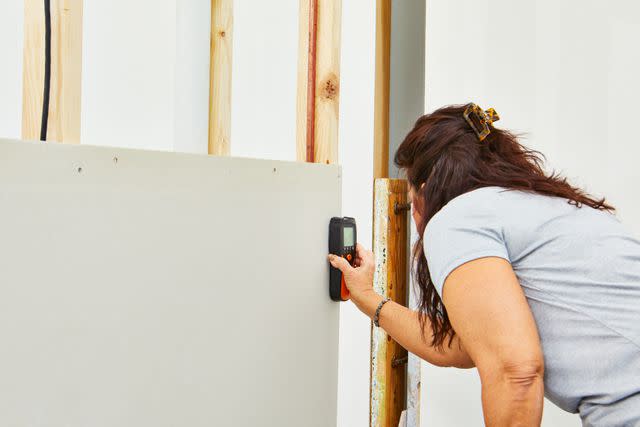
Real Simple / Henry Wortock
Bosch GMS120 Digital Multi-Scanner
Best Stud Finder for PVC Pipes
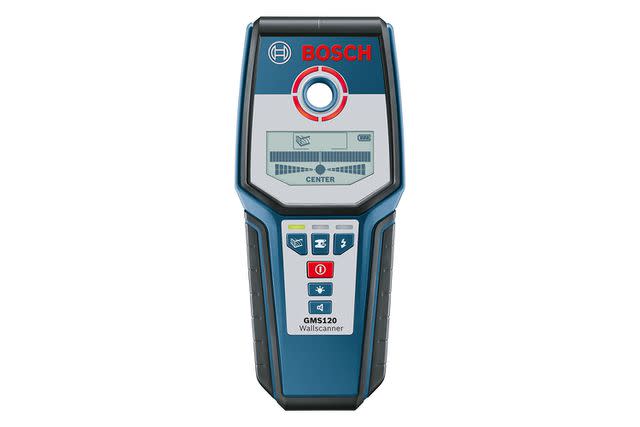
Who it’s for: People who want a professional-grade stud finder with a unique LCD display.
Who it isn’t for: People who want a compact, beginner-friendly stud finder.
If you need a stud finder for PVC pipes, look no further than this top-notch electronic option from Bosch. While this pick is a bit heavier than the others on our list, we still found it comfortable to hold and easy to maneuver in our tests. The device has a far deeper detection depth than many other stud finders and is able to locate wood and metal in concrete, live wiring, copper, and more. There are three modes to choose from, and the stud finder comes with a helpful LCD display and flashing ring light, which we found helpful.
The display features a bar chart diagram that increases as you get closer to an object’s center, a color-changing light, and an accompanying beeping sound to provide plenty of queues as you work. Unfortunately, it doesn't show the object's sides, and we found that it works best when you pass the tool over the wall five times.
This stud finder is the most expensive option on our list, but for home renovations or high-stakes improvement projects, the price is worth the quality.
Price at time of publish: $100
Product Details:
Sensor Type: Electronic
Max Detection Depth: 4.3 inches
Weight: 1.1 pounds
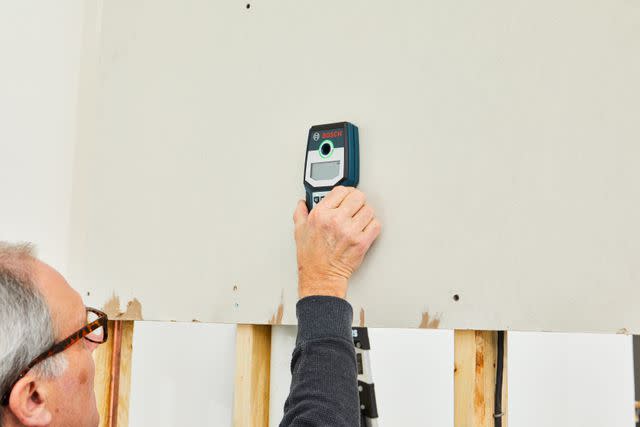
Real Simple / Henry Wortock
Dewalt 1-1/2 in. Stud Finder
Best Stud Finder for Copper Pipes
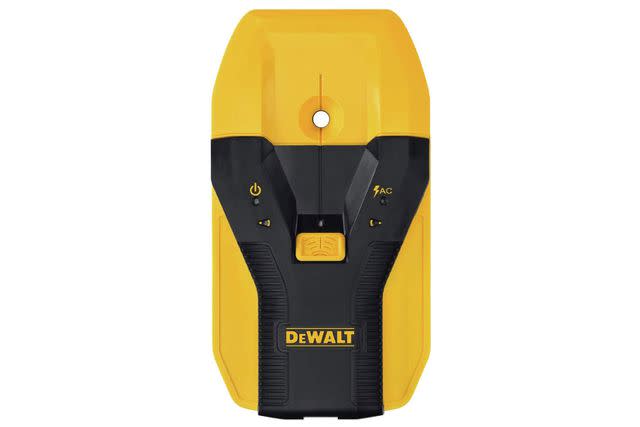
Who it’s for: People who want an accurate stud finder for many surfaces.
Who it isn’t for: People who want a stud finder to detect PVC pipes.
For anyone who needs to detect studs in copper pipes, the DeWalt Stud Finder is a must-have tool. During our testing, this electronic stud finder found the center of each stud no matter the surface with just one slow pass and no calibration needed.
This tool provides helpful directional LED arrows to guide you as you near the stud and a beeping sound that goes off once it identifies the center—but keep in mind that this pick does not denote the edges. Plus, the stud finder identifies copper pipes and AC wires accurately, and even though there’s no display screen, it’s still simple to use. Another great perk of this stud finder is its lightweight feel, comfortable hold, and low price. We found that this stud finder could not identify PVC pipes, so if your next home project requires PVC reading, we recommend another pick.
Price at time of publish: $32
Product Details:
Sensor Type: Electronic
Max Detection Depth: 1.5 inches
Weight: Not listed
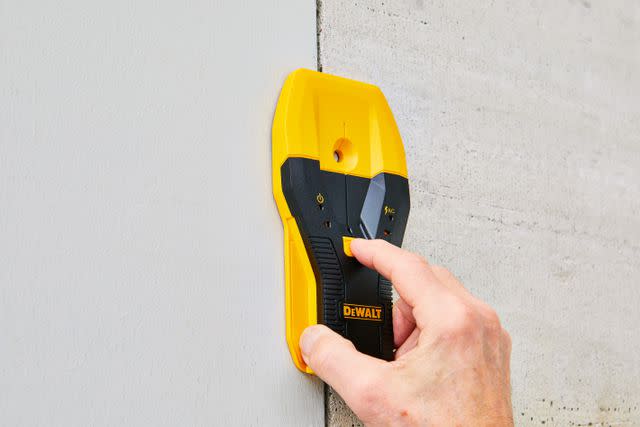
Real Simple / Henry Wortock
Final Verdict
Our top pick is the Franklin Sensors ProSensor M90 Professional Stud Finder for its high level of accuracy, helpful LED lights, and ease of use. If you need to keep costs lower, though, we also recommend the Craftsman Stud Sensor, which is simple, compact, and precise.
Our Testing Process
To find the best stud finders on the market, we acquired 30 models and tested them in our Lab. We passed each stud finder over three different wall surfaces including drywall, plaster, and paneling, and searched for five different object types including wood studs, metal studs, electrical wiring, PVC pipe, and copper pipe.
To begin, we turned on the stud finder and referred to the manufacturer’s instructions on calibration—some models require no setup, while others do. If the tested model had multiple modes for different objects, we coordinated the stud finder to match the corresponding object or material. We placed the stud finder flush with the wall and passed over roughly 3 feet of space over a duration of 20 seconds, with a slow and controlled movement. Then, we ran the stud finder over the same area in five seconds to evaluate if it was still able to detect the objects. This process was repeated on each surface type with each object.
If the tested model has additional features, like a bubble level, battery indicator, or visual display, we took note of how effectively they worked and whether they improved the product overall. After the testing was complete, we gave each product a rating on attributes of performance, design, ease of use, and value.

Real Simple / Henry Wortock
How to Shop for Stud Finders Like a Pro
Sensor Type
There are two main types of stud finders: electronic and magnetic. Electronic stud finders sense changes in density and alert you to the locations of studs and other objects behind walls, while magnetic stud finders detect the nails that attach the studs to the wall instead. During our testing, we evaluated 25 electronic stud finders and five magnetic models.
Overall, we found electronic finders to be more precise, especially with added features like LED screens or indicator lights. They also have more depth capacity, which can translate to a better read on objects hidden beneath a wall. On the other hand, electronic models are usually pricier, require batteries, and are often larger and harder to hold than magnetic alternatives. Some magnetic models, like the Calculated Industries 7310 StudMark Magnetic Stud Finder, are equally as effective, but may not pick up on smaller studs or nails.
Max Detection Depth
“The average stud finder has a depth detection of 1.5–2.5 inches, which allows for wood or metal studs and joists to be located that depth behind a wall’s surface,” says Brian Shaunfield, store manager at a Charlotte-area Lowe’s. “For the average home, this level of depth detection is sufficient.”
While the depth capacity of most of our top products fell within this range, we found that stud finders with a greater depth capacity, like the Bosch GMS 120 Wall Scanner, detected PVC pipes more effectively. If you’re working on a more intensive project, opt for a stud finder with a greater-than-average depth detection level—just be prepared to pay a higher cost.
Surface Compatibility
Consider the common types of surfaces you encounter with a stud finder—the walls in your home are a good place to start. Some stud finders have multiple modes you can tailor to the project, while others have one preset mode that can read through several surface types. In our testing, we found that most models performed best with drywall surfaces and struggled most when reading through cement board, though there was some variation depending on the particular model. According to Shaunfield, most models are compatible with drywall, through which they can locate studs “easily and accurately,” he says.
That said, “stud finders may be less effective on lath/plaster walls,” he says. This observation was confirmed throughout our testing, though the models we selected as our top picks were able to successfully read all surfaces. If you’re working with those materials, you may want to use a finder with a metal-scanning feature “to locate the nails securing the path to the studs” or manually locate the studs instead, according to Shaunfield.
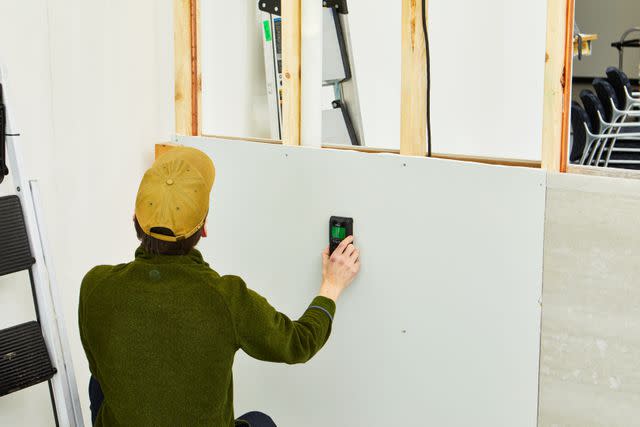
Real Simple / Henry Wortock
More Stud Finders to Consider
Franklin Sensors ProSensor 710+ Professional Stud Finder: This pick was simple to use and accurate at identifying the edges and center of wood or metal studs. That said, it isn’t great at finding objects behind dense surfaces like cement and is relatively high-priced.
Vivreal 4-in-1 Stud Finder: This electronic stud finder features a helpful LCD display and detects studs quickly and accurately, but didn’t stand out from its competition in our tests. Plus, it’s better at detecting wood studs than metal studs, which are more common.
Questions You Might Ask
Is there a difference between a stud finder and a stud sensor?
According to Shaunfield, there isn't a significant difference between a stud finder and a stud sensor. “A stud sensor is another name for a stud finder,” he explains. “Handheld devices labeled as either a sensor or a finder can both be used to locate studs within the home.”
Sometimes stud finders are used to refer to magnetic devices that locate the nails and screws, while stud sensors are used to refer to electronic models that sense changes in electrical flow to detect the wood, metal, and wiring behind a wall.
Are stud finders accurate?
“Stud finders are exceptionally accurate,” says Shaunfield. The sensors will locate the centers of a stud (and, with some devices, also the edges) precisely “so that its location can be marked directly,” he says. Many models will also display the width and length of studs, giving you even more accurate results.
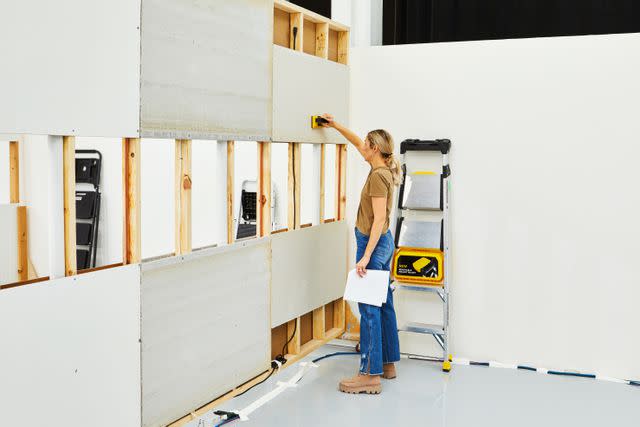
Real Simple / Henry Wortock
Is a stud finder necessary?
For any home project where you hang or drill into a wall, stud finders are absolutely necessary. “Locating studs is critical to properly hanging many objects, and stud finders are a seamless way to identify studs quickly and effectively,” he says. “Many fasteners and hangers used to hang heavy objects, such as large pictures, mirrors, shelves, and television mounting systems, need to be anchored in studs because the wall alone isn’t strong enough to support the weight. Studs hold these fasteners better, preventing them from pulling out under the weight of the object. The center of a stud provides the best support for the fasteners.”
Take Our Word for It
This article was written by Rachel Simon, a writer for Real Simple, Better Homes & Gardens, The New York Times, and many other publications. To write this article, we tested 30 different stud finders and evaluated them based on performance, value, ease of use, and design. For expert insight, Rachel spoke to Brian Shaunfield, store manager at a Charlotte-area Lowe’s.
What Is Real Simple Selects?
Next to each product on this list, you may have noticed a Real Simple Selects seal of approval. Any product appearing alongside that seal has been vetted by our team—put through tests and graded on its performance to earn a spot on our list. Although we buy most of the products we test, sometimes we do get samples from companies if purchasing a product ourselves isn’t an option. All products go through the same rigorous process, whether they are purchased or sent by the company.
Love our recommendations? Check out more products that have earned the Real Simple Selects, from humidifiers to cordless vacuums.
For more Real Simple news, make sure to sign up for our newsletter!
Read the original article on Real Simple.

 Yahoo Movies
Yahoo Movies 